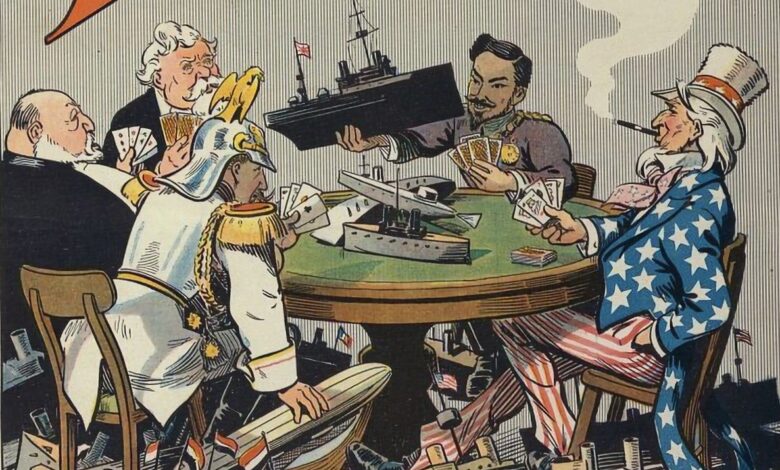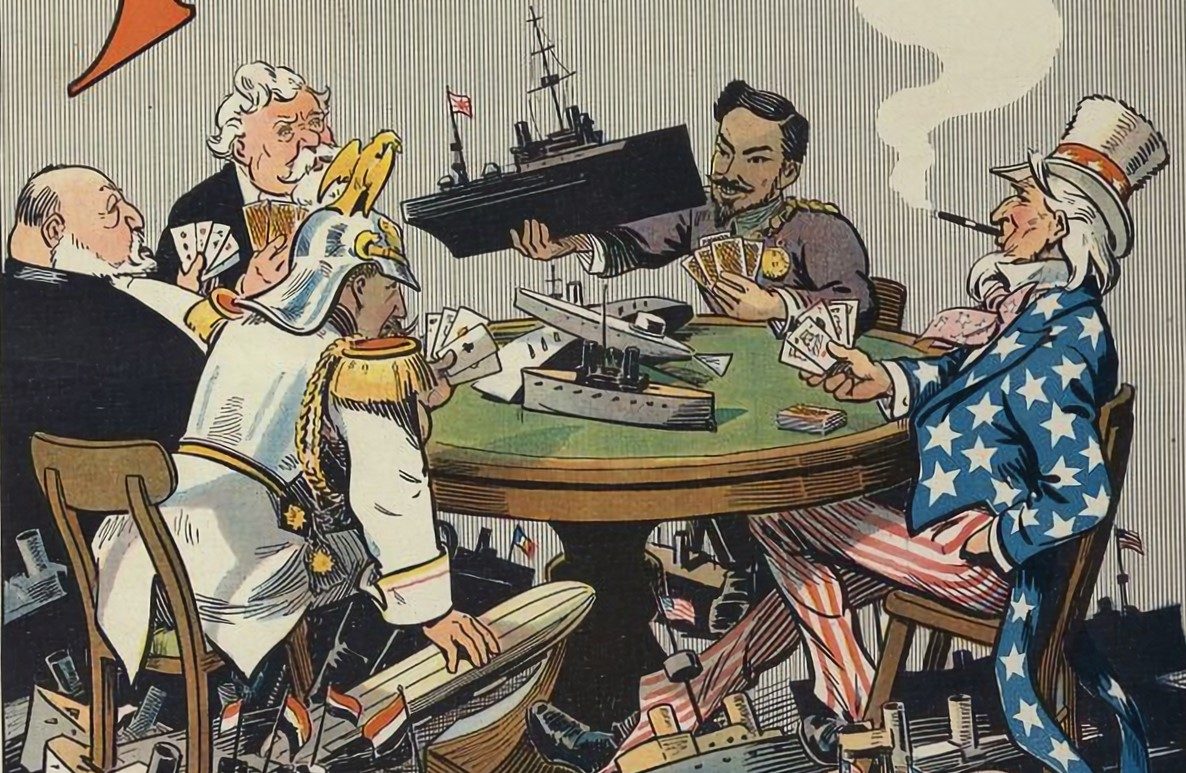
Why Economic Warfare Nearly Always Misses Its Target
Why economic warfare nearly always misses its target is a question that deserves serious consideration. It’s a complex issue, far from the simplistic narrative often presented in headlines. We tend to picture sanctions as a precise scalpel, surgically targeting a rogue regime. The reality, however, is far messier, involving unintended consequences, global interdependence, and the remarkable resilience of targeted economies.
This post will delve into the reasons why economic sanctions so often fall short of their intended goals.
From the ripple effects impacting unintended actors and sectors to the surprising ways sanctions can actually
-strengthen* targeted regimes, the story is filled with unexpected twists. We’ll explore how global supply chains and international trade relationships create loopholes, allowing sanctioned entities to circumvent restrictions. We’ll also examine how targeted economies adapt and even thrive under pressure, often developing ingenious strategies to mitigate the impact of sanctions.
Ultimately, understanding the limitations of economic warfare requires a nuanced perspective that considers geopolitical factors, data limitations, and the crucial role of domestic policies.
Unintended Consequences of Sanctions

Economic sanctions, while intended to pressure targeted regimes into changing their behavior, often produce a complex web of unintended consequences that can undermine their effectiveness and even exacerbate the very problems they aim to solve. The ripple effects extend far beyond the initial target, impacting innocent civilians, neighboring countries, and even the international community as a whole. These unforeseen outcomes frequently negate the intended benefits and can even strengthen the resolve of the sanctioned regime.Sanctions’ Ripple Effects on Unintended Actors and SectorsThe imposition of sanctions rarely confines its impact to the intended target.
Economic restrictions, such as trade embargoes or financial freezes, can disrupt global supply chains, leading to shortages of essential goods and services in both the targeted country and beyond. For instance, sanctions on a major oil producer could lead to increased global oil prices, impacting consumers worldwide. Similarly, restrictions on the export of specific technologies can hinder the development of crucial industries in other countries that rely on those technologies.
The interconnected nature of the global economy ensures that sanctions create a domino effect, with repercussions felt far beyond the initial target.
Sanctions Strengthening Targeted Regimes
Sanctions can paradoxically strengthen the targeted regime by consolidating domestic support. When a country faces external pressure, a sense of national unity and patriotism often emerges, rallying the population behind the leadership. This “rally ’round the flag” effect can bolster the regime’s legitimacy and enhance its ability to withstand the pressure of sanctions. Furthermore, sanctions can create resentment towards the imposing countries, strengthening the resolve of the targeted regime and its population to resist external interference.
This dynamic is often seen in countries where sanctions are perceived as unjust or overly punitive.
Examples of Sanctions Backfiring
Numerous historical examples demonstrate the unintended humanitarian and economic consequences of sanctions. The sanctions imposed on Iraq following the 1990 Gulf War, for example, led to a significant decline in the country’s healthcare system and infrastructure, resulting in widespread suffering among the civilian population. The “oil-for-food” program, designed to mitigate the humanitarian crisis, was ultimately plagued by corruption and inefficiency.
Similarly, sanctions against Cuba have had a prolonged and devastating effect on the island’s economy, limiting access to essential goods and hindering economic development. The impact of these sanctions is widely debated, with some arguing that they have stifled the Cuban economy and limited its development, while others point to the country’s resilience and survival despite the ongoing sanctions.
Hypothetical Scenario: Trade Embargo on a Hypothetical Country
Imagine a hypothetical scenario where a trade embargo is imposed on a small, developing country heavily reliant on the export of agricultural products. The immediate consequence would be a collapse in the country’s export market, leading to widespread unemployment among farmers and agricultural workers. This would cause a significant decline in domestic income, leading to increased poverty and food insecurity.
The lack of access to essential imports, such as fertilizers and machinery, would further hinder agricultural production, creating a vicious cycle of economic decline. Neighboring countries that rely on the targeted country for agricultural products could also experience shortages and price increases, creating regional economic instability and potentially fueling social unrest. The embargo could also trigger a humanitarian crisis, with widespread malnutrition and disease outbreaks, particularly among vulnerable populations.
This scenario illustrates how seemingly targeted economic measures can have far-reaching and devastating unintended consequences.
The Role of Global Interdependence
Economic warfare, while intended to cripple a target nation’s economy, often backfires due to the intricate web of global interdependence. The interconnectedness of modern economies, characterized by complex supply chains and extensive international trade, significantly limits the effectiveness of sanctions and other economic measures. The assumption that a targeted economy can be isolated and damaged without significant spillover effects is frequently proven false.The limitations of economic warfare become strikingly apparent when considering the globalized nature of production and consumption.
Modern manufacturing relies on intricate global supply chains, with components sourced from numerous countries before assembly and distribution. Sanctions on one nation can disrupt these chains, impacting not only the targeted country but also its trading partners, leading to shortages, price increases, and broader economic instability.
Sanctions’ Effectiveness Across Different Levels of Economic Integration
Countries with strong international ties and extensive economic integration are far more resilient to sanctions than those with limited global engagement. A nation deeply embedded in global trade can often find alternative sources for goods and services, mitigating the impact of restrictions. For instance, if sanctions are imposed on a major exporter of a particular raw material, other countries may step in to fill the supply gap, lessening the intended effect on the targeted nation.
Conversely, a country with weak international ties and a less diversified economy will be more vulnerable to sanctions, as its options for circumventing restrictions are limited. The effectiveness of sanctions against North Korea, for example, is arguably greater than against China due to the latter’s much larger and more diversified economy and extensive trade network.
Circumventing Sanctions Through Global Interdependence
Global interdependence creates numerous loopholes that allow sanctioned entities to circumvent restrictions. Sophisticated financial transactions, shell companies, and offshore banking can be used to mask the origin and destination of funds, thereby evading sanctions. Moreover, the ease of cross-border trade allows sanctioned countries to obtain essential goods and services through third-party intermediaries, further undermining the effectiveness of economic warfare.
For example, sanctioned countries may use neighboring countries as transit points for illicit trade or rely on informal channels to procure essential supplies.
Interconnectedness of Global Economies
The following table illustrates the interconnected nature of global economies and how sanctions on one country can have ripple effects across others. This highlights the inherent limitations of targeting specific economies without considering the wider implications.
| Country A (Sanctioned) | Country B (Trading Partner) | Country C (Supplier) | Country D (Alternative Supplier) |
|---|---|---|---|
| Exports: Oil, Textiles | Imports: Oil, Consumer Goods | Exports: Machinery, Raw Materials | Exports: Similar Raw Materials, but at higher cost |
| Impact of Sanctions: Reduced Oil Exports | Impact: Higher Oil Prices, Reduced Consumer Goods Imports | Impact: Reduced Demand for Machinery | Impact: Increased Demand, potentially leading to price increases |
| Circumvention: Oil Smuggling via Country E | Response: Seeking alternative oil suppliers, negotiating trade deals with Country D | Response: Diversifying markets, exploring new technologies | Response: Increased production to meet demand |
The Adaptation and Resilience of Targeted Economies
Economic warfare, while aiming to cripple targeted economies, often fails to achieve its objectives due to the remarkable adaptability and resilience demonstrated by the nations subjected to sanctions and other restrictive measures. These economies frequently employ a range of strategies to mitigate the impact of these actions, often leading to unintended consequences for the imposing powers.The capacity of targeted economies to absorb economic shocks and even thrive despite sanctions is a testament to their ingenuity and resourcefulness.
Economic sanctions rarely achieve their goals because they often hurt innocent civilians more than the intended target, leading to unintended consequences. A prime example is the difficulty in transitioning away from fossil fuels – check out this insightful article on how to end coal to see the complexities involved – which highlights how multifaceted these issues are.
Ultimately, the messy realities of global economics often make targeted economic warfare far less effective than hoped.
This resilience stems from a combination of factors, including the ability to diversify trade partners, develop domestic industries, and adapt to the changing global economic landscape. The existence of informal economies and black markets, while problematic in many ways, also plays a significant role in buffering the impact of sanctions.
Strategies for Mitigating the Impact of Economic Warfare
Targeted economies utilize various strategies to lessen the blow of economic warfare. These include diversifying trade relationships to reduce reliance on sanctioned nations, investing in domestic industries to reduce dependence on imports, developing alternative financial mechanisms to circumvent sanctions, and engaging in diplomatic efforts to garner international support or negotiate more favorable terms. Furthermore, the informal economy often provides a crucial safety net for populations facing economic hardship, allowing for continued trade and economic activity despite official restrictions.
Examples of Successful Adaptation to Sanctions and Economic Pressure
Iran provides a compelling case study. Facing extensive international sanctions, Iran has actively pursued strategies to diversify its economy and reduce its reliance on oil exports. It has invested in domestic industries, particularly in the agricultural and manufacturing sectors, and has strengthened its trade relationships with countries like China and Russia. While sanctions have undoubtedly had a negative impact on the Iranian economy, the country’s ability to adapt and maintain a degree of economic stability demonstrates the potential for resilience in the face of economic warfare.
Similarly, Venezuela, despite facing crippling sanctions and economic hardship, has found ways to maintain some level of economic activity through informal trade networks and alternative economic partnerships. These examples highlight the adaptability of nations subjected to economic pressure.
The Role of Black Markets and Informal Economies in Undermining Sanctions
Sanctions often inadvertently create or strengthen black markets and informal economies. These unregulated markets operate outside the formal economic system, enabling sanctioned countries to circumvent restrictions on trade and finance. The illicit trade of goods and services, facilitated by complex networks of intermediaries, undermines the effectiveness of sanctions by providing alternative channels for economic activity. This phenomenon is particularly evident in countries subject to comprehensive sanctions regimes, where the limitations on formal trade channels push economic activity into the shadows.
The scale and complexity of these informal economies often make them difficult to monitor and control, thereby rendering sanctions less effective in achieving their intended goals.
Case Study: Iran’s Diversification and Domestic Policy Adjustments
Iran’s response to international sanctions exemplifies a successful navigation of economic pressure through diversification and domestic policy adjustments. Faced with restrictions on its oil exports, Iran strategically invested in developing its agricultural sector and expanding its manufacturing capabilities. This shift away from heavy reliance on oil revenue helped mitigate the impact of sanctions. Simultaneously, Iran strengthened its trade ties with countries not participating in the sanctions regime, finding alternative markets for its exports and sources for its imports.
While the Iranian economy undoubtedly faced challenges, its ability to adapt and maintain a degree of economic stability underscores the capacity of targeted economies to navigate economic warfare through proactive policy adjustments and strategic diversification.
The Influence of Geopolitical Factors: Why Economic Warfare Nearly Always Misses Its Target
Economic warfare, while aiming for specific economic targets, rarely operates in a vacuum. Its effectiveness is profoundly shaped by the complex web of geopolitical relationships, alliances, and rivalries that characterize the international system. Understanding these dynamics is crucial to analyzing the often-unpredictable outcomes of sanctions and other economic coercive measures.The success or failure of economic warfare is significantly influenced by the broader geopolitical landscape.
Political alliances and international relations can either bolster or undermine the impact of sanctions. A strong, unified coalition supporting the sanctions can exert considerable pressure on the target, while dissent or active opposition from key players can significantly weaken the effectiveness of the measures.
Multilateral versus Unilateral Sanctions
Multilateral sanctions, imposed by international organizations like the UN, generally enjoy greater legitimacy and broader participation than unilateral sanctions imposed by individual states. This broader participation often translates to a more significant economic impact on the target. However, achieving consensus within multilateral organizations can be a lengthy and challenging process, potentially delaying the implementation of sanctions and allowing the target state time to adapt.
Unilateral sanctions, while quicker to implement, often face criticism for lacking legitimacy and may be less effective due to the limited scope of participation. The effectiveness, therefore, is often a trade-off between speed and breadth of impact. For example, the comprehensive sanctions imposed on Iran by the UN Security Council were significantly more impactful than earlier, unilateral sanctions imposed by the US alone.
Economic sanctions rarely achieve their intended goals because they often hurt innocent civilians more than the targeted regime, creating unintended consequences. A heartwarming counterpoint is this incredible initiative: 3 million proceeds from betsy ross t shirt will build homes for families of fallen soldiers , showcasing the power of direct, positive action. Ultimately, the diffuse nature of economic warfare makes it a blunt instrument, far less effective than targeted aid or other forms of direct support.
The Role of External Actors in Sanctions Regimes
External actors can play a critical role in either supporting or undermining sanctions regimes. States with close ties to the target nation might actively circumvent sanctions through various means, such as providing alternative trade routes or financial channels. This is often referred to as “sanctions busting”. Conversely, countries aligned with the imposing state might actively enforce sanctions, further isolating the target.
Economic warfare rarely works as planned because it’s incredibly difficult to isolate the intended target. Sanctions often hurt innocent civilians more than the intended regime, leading to unintended consequences. This reminds me of the article about how the Democrats are trying to reach rural voters with Tim Walz – the democrats want tim walz to speak to rural americans they arent listening – highlighting how communication breakdowns can similarly lead to missed targets.
Ultimately, both economic warfare and political messaging require a nuanced understanding of complex systems to avoid collateral damage.
For example, China’s economic relationship with Iran, despite US sanctions, has played a significant role in mitigating the impact of those sanctions on the Iranian economy. Similarly, the EU’s enforcement of sanctions against Russia following its invasion of Ukraine demonstrates the potential for allies to strengthen the effectiveness of a sanctions regime.
Geopolitical Dynamics and Sanctions Impact: A Flowchart
The following flowchart illustrates how various geopolitical factors can influence the effectiveness of economic sanctions:[Imagine a flowchart here. The flowchart would begin with a box labeled “Sanctions Imposed.” This would branch into two boxes: “Multilateral Support” and “Unilateral Action.” “Multilateral Support” would branch into “Strong Enforcement” leading to “Significant Economic Impact” and “Weak Enforcement” leading to “Limited Economic Impact”.
“Unilateral Action” would branch into “Broad International Support” leading to “Moderate Economic Impact” and “Limited International Support” leading to “Minimal Economic Impact”. All “Economic Impact” boxes would then branch into a final box: “Geopolitical Outcomes”.]The flowchart depicts how the level of multilateral support, the nature of the imposing action (multilateral or unilateral), and the level of international support all interact to determine the economic impact of sanctions.
The ultimate geopolitical outcomes, such as regime change, policy concessions, or continued defiance, depend on the magnitude of this economic impact and the target state’s ability to adapt.
The Limitations of Data and Measurement
Accurately assessing the impact of economic warfare is notoriously difficult, hampered by a complex interplay of factors and inherent limitations in data collection and analysis. The lack of reliable, comprehensive, and comparable data often obscures the true effectiveness – or lack thereof – of sanctions and other economic measures. This makes it challenging to definitively attribute observed economic changes solely to the imposed restrictions.The challenges in measuring the impact of economic warfare stem from several key issues.
Firstly, the target economies themselves may lack the capacity or the willingness to provide accurate and transparent data. Secondly, even when data is available, it’s often difficult to isolate the effects of sanctions from other concurrent economic factors, such as global economic downturns, domestic policy choices, or natural disasters. Finally, the very act of imposing sanctions can lead to data manipulation and obfuscation, making it nearly impossible to obtain a clear picture of the situation.
Data Manipulation and Lack of Transparency
Governments subjected to economic warfare often have strong incentives to manipulate economic data to minimize the apparent impact of sanctions. This can involve underreporting negative economic indicators or overstating positive ones. For example, a country facing sanctions might underreport its inflation rate or unemployment figures to project an image of resilience. Conversely, they might overstate export figures to demonstrate continued economic activity, even if this involves creative accounting practices.
Furthermore, a lack of transparency in data collection methods and a limited access to independent audits further complicates the process of accurate assessment. The absence of robust and reliable data makes it nearly impossible to separate genuine economic trends from those deliberately obscured.
Distinguishing Sanctions Effects from Other Factors, Why economic warfare nearly always misses its target
Separating the impact of sanctions from other influences on a target economy presents a significant methodological challenge. For instance, consider a country facing sanctions that also experiences a sharp decline in commodity prices. The resulting economic downturn could be attributed solely to sanctions, or partially to the decline in commodity prices, or to a combination of both. Similarly, internal political instability, corruption, or mismanagement can all independently influence economic performance, making it difficult to isolate the effect of sanctions.
Econometric modeling, while helpful, is frequently challenged by the presence of confounding variables and the inherent complexity of economic systems. Robust counterfactual analysis – essentially, modeling what would have happened
without* the sanctions – is often impractical due to data limitations and the inherent uncertainty of predicting future economic outcomes.
Limitations of Economic Data Used to Assess Sanctions Effectiveness
The following points highlight the limitations inherent in using economic data to assess the effectiveness of sanctions:
- Data Availability and Quality: Many target economies lack robust data collection systems, leading to incomplete or unreliable data.
- Data Comparability: Differences in data collection methodologies across countries make cross-national comparisons challenging.
- Time Lags: The impact of sanctions often unfolds over time, making it difficult to immediately assess their effectiveness.
- Confounding Factors: It is difficult to isolate the effects of sanctions from other economic and political factors.
- Data Manipulation and Censorship: Governments may manipulate or suppress data to downplay the negative impact of sanctions.
- Limited Access to Information: Researchers often lack access to necessary data due to restrictions or lack of transparency.
The Importance of Domestic Policies

Economic warfare, while aiming to cripple a target nation’s economy, often fails to achieve its intended objectives. A crucial factor overlooked in many analyses is the significant role played by a nation’s internal dynamics. The effectiveness of sanctions and other economic pressures is profoundly shaped by domestic policies, institutional strength, and the overall governance environment. A country’s internal vulnerabilities can either amplify or mitigate the impact of external economic shocks.Internal factors like corruption, weak governance, and economic mismanagement significantly influence a country’s susceptibility to economic warfare.
These weaknesses create fertile ground for sanctions to take root and cause widespread damage, while strong institutions and sound economic policies can often buffer the blow. The resilience of a nation facing economic pressure is not solely determined by external factors but also, and perhaps more importantly, by its internal strength and capacity for adaptation.
Corruption’s Amplifying Effect on Sanctions
Corruption acts as a potent amplifier of the negative effects of economic sanctions. When a nation’s institutions are riddled with corruption, resources intended for mitigating the impact of sanctions are often diverted or misused. This leads to a more severe economic contraction than might otherwise occur. For example, sanctions against a corrupt regime might lead to increased smuggling and illicit activities, exacerbating the economic crisis rather than containing it.
The lack of transparency and accountability further hinders effective responses to economic pressure. The resources meant to cushion the blow of sanctions are often siphoned off, leaving the population more vulnerable. In such cases, sanctions can inadvertently deepen existing inequalities and social unrest.
Strong Institutions versus Weak Governance
Countries with robust and transparent governance structures tend to demonstrate greater resilience to economic warfare. Strong institutions, including independent judiciaries, a free press, and a well-functioning civil service, can facilitate effective policy responses and resource allocation during times of economic stress. Conversely, nations characterized by weak governance, political instability, and lack of accountability often struggle to implement effective countermeasures against economic pressure.
Their economies are more vulnerable to shocks, and their populations are more likely to suffer disproportionately from the consequences of sanctions. This disparity in resilience highlights the crucial role of good governance in mitigating the impact of economic warfare.
Domestic Policies: Mitigation and Amplification
Domestic policies play a crucial role in either amplifying or mitigating the effects of economic pressure. Sound macroeconomic management, including prudent fiscal and monetary policies, can significantly reduce a country’s vulnerability. Diversification of trade partners and investment sources can also help to reduce dependence on a single market or source of funding, thereby reducing the impact of sanctions.
Conversely, poor economic management, such as excessive reliance on a single export commodity or heavy dependence on foreign debt, can exacerbate the negative effects of economic warfare. The absence of social safety nets can also worsen the impact on vulnerable populations.
Comparative Analysis: Venezuela and Cuba
Venezuela, under the Maduro regime, offers a stark example of a country with weak governance severely affected by sanctions. Existing corruption and economic mismanagement significantly amplified the negative impact of international sanctions, leading to a severe humanitarian crisis. The lack of transparency and accountability made it difficult to effectively allocate resources and mitigate the effects of the sanctions.
In contrast, Cuba, despite facing decades of US sanctions, has demonstrated a degree of resilience. While certainly impacted negatively, Cuba’s centralized economy and relatively diversified trade relationships have allowed it to absorb some of the economic shocks, although at a significant cost to its population’s standard of living. This difference illustrates how internal factors, particularly governance and economic management, significantly shape a nation’s response to economic warfare.
Economic warfare, despite its frequent deployment, is a blunt instrument. Its effectiveness is consistently hampered by unintended consequences, the complexities of global interdependence, and the adaptive capacity of targeted economies. While the intent behind sanctions might be noble, the reality often falls short. A deeper understanding of these limitations is crucial for policymakers seeking to achieve their foreign policy goals without causing widespread unintended harm.
Perhaps, focusing on more targeted and multilateral approaches, combined with a frank acknowledgement of the limitations of economic pressure, would yield better results in the long run.


